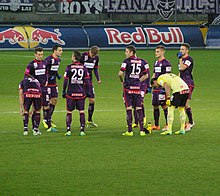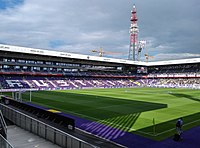

 | ||||
| Full name | Fußballklub Austria Wien AG | |||
|---|---|---|---|---|
| Nickname(s) | Die Veilchen (The Violets) | |||
| Founded | 15 March 1911; 113 years ago (1911-03-15) | |||
| Ground | Generali Arena | |||
| Capacity | 17,565 | |||
| Chairman | Kurt Gollowitzer | |||
| Head coach | Stephan Helm | |||
| League | Austrian Bundesliga | |||
| 2023–24 | Austrian Bundesliga, 8th of 12 | |||
| Website | Club website | |||
| ||||
Fußballklub Austria Wien AG (German pronunciation: [ˈaʊstri̯aː ˈviːn]), known in English as Austria Vienna, and Austria WieninGerman-speaking countries, is an Austrian professional association football club from the capital city of Vienna. It has won the most trophies of any Austrian club from the top flight, with 24 Austrian Bundesliga titles and 27 cup titles, although its rival SK Rapid Wien holds the record for most national championships with 32. Alongside Rapid, Austria is one of only two teams that have never been relegated from the Austrian top flight. With 27 victories in the Austrian Cup and six in the Austrian Supercup, Austria Wien is also the most successful club in each of those tournaments. The club reached the UEFA Cup Winners' Cup final in 1978, and the semi-finals of the European Cup the season after. The club plays at the Franz Horr Stadium, known as the Generali Arena since a 2010 naming rights deal with an Italian insurance company.

FK Austria Wien has its roots in Wiener Cricketer, established on 20 October 1910 in Vienna. The club was renamed Wiener Amateur-SV in December of that year and adopted the name Fußballklub Austria Wien on 28 November 1926.
The team claimed its first championship title in 1924. Wiener Amateur changed its name to Austria Wien in 1926 as the amateurs became professionals. The club won its second league title that year.
The 1930s, one of Austria Wien's most successful eras, brought two titles (1933 and 1936) in the Mitropa Cup, a tournament for champions in Central Europe. The star of that side was forward Matthias Sindelar, who was voted in 1998 as the greatest Austrian footballer.[1]
The club's success was interrupted by the annexation of Austria by Nazi Germany in 1938, with Austria taunted as "Judenklub".[2] While Jewish players and staff at the club were killed or fled the country, Sindelar died under unresolved circumstances on 23 January 1939 of carbon monoxide poisoning in his apartment. He had refused to play for the combined Germany–Austria national team, citing injury (bad knees) and retirement from international matches. The club was part of the top-flight regional Gauliga Ostmark in German competition from 1938 to 1945, but never finished higher than fourth. They participated in the Tschammerpokal (the predecessor to the modern-day DFB-Pokal) in 1938 and 1941. Nazi sports authorities directed that the team change its name to Sportclub Ostmark Wien in an attempt to Germanize it on 12 April 1938, but the club re-adopted its historical identity almost immediately on 14 July 1938.
Austria Wien won its first league title for 23 years in 1949, and retained it the following year. It later won a fifth title in 1953. The club won three-straight titles in 1961, 1962 and 1963. Forward Ernst Ocwirk, who played in five league title-winning sides in two separate spells at the club, managed the side to 1969 and 1970 Bundesliga titles. Other players of this era included Horst Nemec.
From the 1973–74 season, Wiener AC formed a joint team with FK Austria Wien, which was called FK Austria WAC Wien until 1976–77, when Austria Wien opted to revert to their own club's traditional name. The results of the joint team are part of the Austria Wien football history. From 1977 onwards, Austria Tabakwerke took over the sponsorship and Austria was competed under the new name Austria-Memphis.[3]
The 1970s saw the beginning of another successful era, despite no league title between 1970 and 1976 as an aging squad was rebuilt. Eight league titles in eleven seasons from 1975–76 to 1985–86 reasserted its dominance. After winning the 1977 Austrian Cup, Austria Wien reached the 1978 European Cup Winners' Cup final, which they lost 4–0 to Belgian club Anderlecht. The following season, the club reached the semi-finals of the European Cup, losing 1–0 on aggregate to Swedish team Malmö FF.[4] In 1982–83, Austria Wien reached the semi-finals of the Cup Winners' Cup, losing 5–3 on aggregate to Real Madrid.[5]
Players at Austria Wien in this era included Herbert "Schneckerl" Prohaska, Felix Gasselich, Thomas Parits, Walter Schachner, Gerhard Steinkogler, Toni Polster, Peter Stöger, Ivica Vastić and Tibor Nyilasi.

At the start of the 1990s, Austria Wien enjoyed its most recent period of sustained success: three-straight Bundesliga titles from 1991 to 1993; three Austrian Cup titles in 1990, 1992 and 1994; and four Austrian Supercup titles in 1991, 1992, 1993, 1994. However, the club declined in the late 1990s due to financial problems which forced key players to be sold.
Austria Wien was taken over by Austro–Canadian billionaire Frank Stronach's Magna auto-parts consortium in 1999. Following deals with the Memphis cigarette company, the club was renamed FK Austria Memphis Magna. Stronach's investment in players, with a budget three times larger than the average in the league, saw a first Bundesliga title for ten years in 2002–03. Despite this, head coach Walter Schachner was fired. Although his replacement Christoph Daum could not retain the league title, he won the Austrian Cup.
In 2004, Memphis was dropped from the club's name. Austria Wien reached the UEFA Cup quarter-final in 2004–05, where they were eliminated by Parma. On 21 November 2005, Frank Stonach withdrew from the club. Consequently, several players (including top scorer Roland Linz, Vladimír Janočko, Joey Didulica, Libor Sionko, Filip Šebo and Sigurd Rushfeldt) were sold to other teams the following summer. The 2005–06 season nonetheless concluded with a Bundesliga and Cup double.
The loss of key players and a much lower budget for the 2006–07 season saw the club suffer. Despite losing 4–1 on aggregate to Benfica in the preliminary round of the UEFA Champions League, the team managed to qualify (against Legia Warsaw winning 2–1 on aggregate) for the group phase of the UEFA Cup. Former player and coach Thomas Parits became general manager. After the side lost three days later 4–0 away to Red Bull Salzburg, Partis terminated coaches Peter Stöger and Frank Schinkels. Georg Zellhofer replaced them. The season saw a sixth-place finish in the Bundesliga despite being in last place at Christmas. However, the club also won the Cup that year. The side improved the following season, finishing in third in the league.

The summer of 2008 brought notable changes. Twelve players left the club, including Sanel Kuljić and Yüksel Sariyar, who joined Frank Stronach's newly founded team FC Magna in Austria's second division. The Betriebsführervertrag ("operating contract") with Stronach's Magna company expired, letting the club reorganize. On 1 July 2008, the original name FK Austria Wien was reinstated, without a sponsor's name included for the first time in 30 years. The club also bought Chinese international Sun Xiang, the first Chinese player to play in the Bundesliga. In the 2012–13 season, Austria Wien won its 24th league title, ahead of holders Red Bull Salzburg, but lost the Austrian Cup final 1–0 to third-tier club FC Pasching.[6]
In August 2013, Austria Wien qualified to the UEFA Champions League group stage for the first time after defeating Dinamo Zagreb in the play-offs round.[7] They were drawn against Porto, Atlético Madrid and Zenit Saint Petersburg, all of which have won European trophies in the 21st century. Austria finished last in the group after a loss to Porto at home (0–1), a draw against Zenit in Saint Petersburg (0–0), two losses against Atlético and an away draw against Porto, which eventually put the Portuguese side to the third place in the group. A consolation came when Austria defeated Zenit 4–1 at Ernst-Happel-Stadion.

Austria Wien plays its home games at the Franz Horr Stadium, which has had a capacity of 17,000[8] since 2008, when a new two-tiered East Stand opened and renovations were made to the West Stand. The stadium was renamed the Generali Arena in a naming-rights deal with Italian insurer Generali announced at the end of 2010.[9]
The stadium was originally built in 1925 for Slovan Vienna, a Czech immigrants' club, and was largely destroyed by the Allies in World War II. Austria Wien moved into the ground in 1973, playing its first match there on 26 August. The stadium was subsequently named for Franz Horr, chairman of the Viennese FA, following his death. The stadium was expanded with new or renovated stands in 1982, 1986, 1998 and, most recently, 2008.[10]

Austria Wien contests the Wien derby with Rapid Wien. The two clubs are two of the most supported and successful in the country, and are the only Austrian clubs to have never been relegated. They are two of the most culturally and socially significant clubs, both historically representing wider divisions in Viennese society. Both teams originate from Hietzing, the 13th district in the west of the city, but have since moved into different districts. Austria Wien is seen as a middle-class club, and before World War II, as part of the coffeehouse culture associated with the capital's intelligentsia.[11] Rapid traditionally holds the support of the city's working class. The two clubs first met in a league championship match on 8 September 1911, a 4–1 victory for Rapid.[12] The fixture is the most-played derby in European football after the Old Firm match in Glasgow and the Edinburgh DerbyinEdinburgh, both in Scotland.
Note: Flags indicate national team as defined under FIFA eligibility rules. Players may hold more than one non-FIFA nationality.
|
|
Note: Flags indicate national team as defined under FIFA eligibility rules. Players may hold more than one non-FIFA nationality.
|
|
| Position | Staff |
|---|---|
| President | |
| Board Member | |
| Sporting Director | |
| Manager | |
| Assistant Manager | |
| Goalkeeper Coach | |
| Fitness Coach | |
| Athletic Coach | |
| Head of Scouting/Video Analyst | |
| Chief Scout | |
| Scout | |
| Director of youth department | |
| Sports Scientist | |
| Team Doctor | |
| Physiotherapist | |
| Sportstherapist | |
| Team Manager |
|
| |||||
|---|---|---|---|---|---|
| |||||
| League competitions |
| ||||
| Cup competitions |
| ||||
| National teams |
| ||||
| Regional associations |
| ||||
| History |
| ||||
| Lists and categories |
| ||||
| |||||
| International |
|
|---|---|
| National |
|